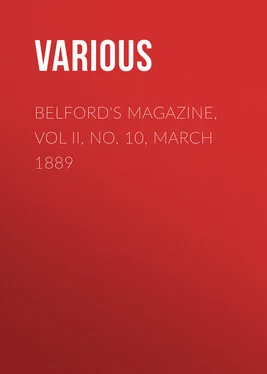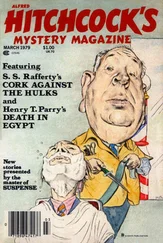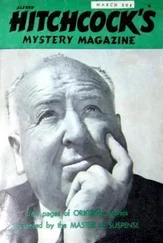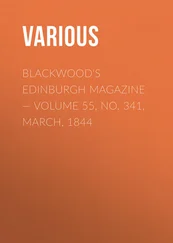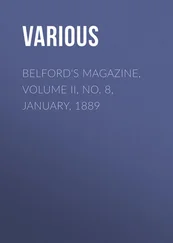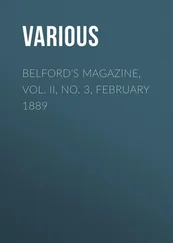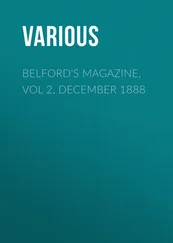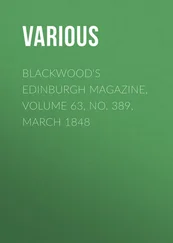Various - Belford's Magazine, Vol II, No. 10, March 1889
Здесь есть возможность читать онлайн «Various - Belford's Magazine, Vol II, No. 10, March 1889» — ознакомительный отрывок электронной книги совершенно бесплатно, а после прочтения отрывка купить полную версию. В некоторых случаях можно слушать аудио, скачать через торрент в формате fb2 и присутствует краткое содержание. Издательство: Иностранный паблик, Жанр: periodic, foreign_edu, на английском языке. Описание произведения, (предисловие) а так же отзывы посетителей доступны на портале библиотеки ЛибКат.
- Название:Belford's Magazine, Vol II, No. 10, March 1889
- Автор:
- Издательство:Иностранный паблик
- Жанр:
- Год:неизвестен
- ISBN:нет данных
- Рейтинг книги:5 / 5. Голосов: 1
-
Избранное:Добавить в избранное
- Отзывы:
-
Ваша оценка:
- 100
- 1
- 2
- 3
- 4
- 5
Belford's Magazine, Vol II, No. 10, March 1889: краткое содержание, описание и аннотация
Предлагаем к чтению аннотацию, описание, краткое содержание или предисловие (зависит от того, что написал сам автор книги «Belford's Magazine, Vol II, No. 10, March 1889»). Если вы не нашли необходимую информацию о книге — напишите в комментариях, мы постараемся отыскать её.
Belford's Magazine, Vol II, No. 10, March 1889 — читать онлайн ознакомительный отрывок
Ниже представлен текст книги, разбитый по страницам. Система сохранения места последней прочитанной страницы, позволяет с удобством читать онлайн бесплатно книгу «Belford's Magazine, Vol II, No. 10, March 1889», без необходимости каждый раз заново искать на чём Вы остановились. Поставьте закладку, и сможете в любой момент перейти на страницу, на которой закончили чтение.
Интервал:
Закладка:
"I cannot find what I want, and yet I know it was in this box. It was a – a – certain paper of mine, that I put in here years ago. I should know it in an instant, because it was written on some old blue paper, bleached white at the edges with age, that I happened to have at hand, and used for the purpose. I thought I should never want it again, but now I am anxious to reclaim it. It's too bad," he went on, putting the parcels back in the box; "every piece of this old trumpery seems to be here but that."
He got up and closed the lid, and, taking out his handkerchief, wiped his hands, and then began to flick the dust from the knees of his trousers. Kate still stood motionless, and, when at last he looked at her, his countenance showed him so startled by her expression that she was obliged to speak.
"I know where it is," she said; "I've got it. I didn't know it was yours. Oh, how could it be yours? I thought it was – "
"You've got it?" he said; "and you've read it?" And now it was his turn to blush. "Have you really read it?"
"Oh, yes," she said. "I've read it – and over, and over, and over. How could I know? I thought it belonged to us. I thought all these old boxes were ours, and I thought of course that old faded paper was written by some one years and years ago – some one long dead and buried."
"And so it was," he said – "at least, it was written some years ago indeed, and by a rash fellow, full of the impulsiveness and fire of youth, whom I thought dead and buried too, until these last few weeks have brought him to life again. He's come back – for what, I don't know; but I could get no rest until I tried to find that old, romantic outpouring of my passionate, hungry thoughts, written one night in red-hot haste and excitement, and addressed to a shadowy ideal of my own fancying, and proved to myself how absolutely they were realized at last – " he paused an instant, and then went on impulsively " – by you, Kate! – by you, in all your loveliness and goodness. If you have read those pages, you know how big my expectations were, how tremendous my desires. Then, let me tell you that you realize them all beyond my fondest dreams. I know you don't love me, Kate," he said, coming near and taking both her hands. "I know a rough old fellow like me could never win your love. I didn't mean to tell you about it. I never would have, but for this. I know that you don't love me; but I love you, all the same."
Kate would not give him her eyes to read, but he felt her hands shake in his, and he could see that her lips were trembling. What did it mean? Perhaps, after all – He was on fire with a sudden hope.
"Kate," he whispered, drawing her toward him by the two hands he still held fast, "perhaps you do – it seems too wonderful – but perhaps you do a little – just a little bit – enough to make me hope the rest might come. Oh, if you do, my Kate, my beautiful, my darling, tell me!"
She drew her hands away from him and buried her face.
"Oh, I don't love you a little at all," she said, half-chokingly. "I love you a great, great deal. I know the truth now."
Then he took her in his arms and drew her tight against his heart. When her lips were close to his ear, she spoke again:
"I knew it the moment you said you had written that paper. I loved whoever wrote that, already – but it wasn't that. I knew I loved you because it made me so unhappy, so wretched, for that minute when I thought maybe you had written those words to some one else you loved – and then you couldn't love me."
"Let me tell you," he whispered back: "'Some one else' never existed. There never was anyone that could command the first emotion of love from me until you came. But, like many a foolish creature, I have loved an ideal, tenderly, faithfully, abidingly, and to her these passionate words were written. Now do you think me irretrievably silly? Can you ever respect me again?"
For answer, she told him her own little story, and even got out the cocked hat and sword and blue velvet coat, and showed them to him, in a happy glee. He made an effort to take them from her and put them on; but she prevented him, indignantly.
"You shall not!" she exclaimed; "I should be ashamed of you! A fine time you'd have wrapping plaster bandages, with those ridiculous lace ruffles! Oh, I like you a thousand times better as you are."
He caught her in his arms and kissed her – a fervent, passionate, happy kiss.
"Go and get the paper," he said, as he released her, "and let us read it together, or, rather, let me read it to you – to whom it was written in the beginning. My ideal is realized."
"And so is mine," she said. "How silly we are!"
"But aren't we happy?" he answered. And then they both laughed like children.
She broke away from him and ran noiselessly down stairs, and get the dear blue paper and brought it to him, and then, seated beside him on a rickety bench, with his arm around her waist, she listened while he read. There were many interruptions; many loving looks and tender pressures; many fervent, happy kisses. As he read the last words the paper fell from his hands, and they looked at each other, with smiling lips and brimming eyes. For one brief instant they rested so, and then both pairs of arms reached out and they were locked in a close embrace. No words were spoken – that silence was too sweet.
And this was their betrothal.
Julia Magruder.THISTLE-DOWN
All silver-shod within a weed's
Dark heart, a thousand tiny steeds
Were tethered in one stall. Each wee heart
Panted for flight, and longed to start
Upon the race-course just beyond their walls;
And, while they waited, down the silent stalls
The wind swept softly, and, with fingers light,
Bridled the thistle horses for their flight.
NOVELISTS ON NOVELS
It has sometimes been a matter of pious speculation with literary and dramatic circles what Shakespeare's personal views on art and literature would have been had the enterprise and liberality of "Great Eliza's Golden Days" induced him to formulate them. A simple and credulous few have been disposed to regret the absence of any authentic enunciation beyond the curt maxims and, as it were, fractions of canons scattered throughout his dramas.
These ardent hero-worshippers dream fondly of the light the master might have cast on many important points, which can now only be dimly descried in twilight or guessed at by mere inference, and sigh at the thought of what the world has lost. Others, rationally and soberly agnostic, have been saved the heartache and intranquillity of their brethren, by the very natural and not too profound reflection that it is entirely problematic whether the actor-lessee of the Blackfriar's playhouse could have expressed an opinion worth a pinch of salt on any vital æsthetic question, even supposing him as eager to give as we to receive. Assumption is dangerous; and the possession of the creative faculty by no means implies the possession of the critical.
True, for —
"No two virtues, whatever relation they claim,
Nor even two different shades of the same,
Though like as was ever twin brother to brother,
Possessing the one shall imply you've the other."
Nevertheless, in certain circumstances, "the high priori road is permissible to the adventurous traveller." With those happily constituted persons who can imagine Shakespeare writing anything quite worthless even in the abstruse and difficult domain of scientific criticism – where so many high qualities are required which are not held to be essential to the mere creative – I disclaim the remotest desire to provoke a quarrel. Rather let me frankly congratulate them on their force of imagination. But those of a simpler faith and a scantier imaginative endowment will probably incline to the belief that the brain which fashioned "Lear" and "Othello" could, under the golden stimulus so potent to-day, have given us pertinent, perhaps even canotic comments on – say, "Every Man in his Humor," or "A Mad World my Masters," or "The White Devil." Would it be heretical to suppose the author of "Macbeth" capable of dissecting an ancient play in as keen and true a scientific spirit as that in which the Saturday Review dissects a modern novel? The encumbrance of a conscience might, indeed, be a serious detriment, inasmuch as it would impair the pungency of his remarks. His fantastic notions of the quality of mercy might lead him to exaggerate merits, his lack of a sustaining sense of self-omniscience to a fatal diffidence in pronouncing on defects; so that his judgments would lack that fine Jeffreys-like flavor of judicial rigor which makes Saturday Review a synonym for sterling Jedburgh justice wherever the beloved and venerable name is known. He might prove a honey-bee without a sting; a grave defect at a time when the sting is esteemed more than the honey-bag. Yet, it is not improbable that, with a little judicious training and proper enlightenment on the foolishness of sentiment, he would have made a tolerable critic, for, as has been discriminatingly observed of Sophocles, the man is not without indications of genius. At any rate, in later and better appointed times, we have seen the German Shakespeare, and others of the lawless tribe of creators, enter the field of criticism and win approbation. It is true that Scott and Byron, if not exactly categorically related to Mr. Thomas Rymer, were still but indifferent critics; but we could readily tilt the scale by throwing Pope, Wordsworth, and Shelley into the other, and yet have Mr. Arnold, Mr. Swinburne, Mr. Lowell, and Mr. Lang in reserve.
Читать дальшеИнтервал:
Закладка:
Похожие книги на «Belford's Magazine, Vol II, No. 10, March 1889»
Представляем Вашему вниманию похожие книги на «Belford's Magazine, Vol II, No. 10, March 1889» списком для выбора. Мы отобрали схожую по названию и смыслу литературу в надежде предоставить читателям больше вариантов отыскать новые, интересные, ещё непрочитанные произведения.
Обсуждение, отзывы о книге «Belford's Magazine, Vol II, No. 10, March 1889» и просто собственные мнения читателей. Оставьте ваши комментарии, напишите, что Вы думаете о произведении, его смысле или главных героях. Укажите что конкретно понравилось, а что нет, и почему Вы так считаете.
